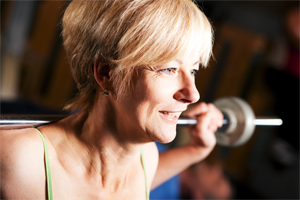 Any menopausal woman can tell you that hot flashes are no fun. Neither are the night sweats, insomnia, increased irritability, anxiety and depression. And while about a quarter of all women experience no symptoms, half have mild to moderate menopausal symptoms, and the rest suffer from severe menopausal problems. However, some studies have shown that menopausal women who exercise fare far better than their more sedentary counterparts.
Any menopausal woman can tell you that hot flashes are no fun. Neither are the night sweats, insomnia, increased irritability, anxiety and depression. And while about a quarter of all women experience no symptoms, half have mild to moderate menopausal symptoms, and the rest suffer from severe menopausal problems. However, some studies have shown that menopausal women who exercise fare far better than their more sedentary counterparts.
A 1990 Swedish study found that women who exercised regularly had half the number of moderate to severe menopausal symptoms as those who did not. And in a recent study performed on 92 menopausal women, researchers at Pennsylvania State University found that those who exercised had fewer hot flashes in the following 24 hours. According to Steriani Elavsky, assistant professor of kinesiology and co-author of the study, “For women with mild to moderate hot flashes, there is no reason to avoid physical activity for the fear of making symptoms worse. In fact, physical activity may be helpful, and is certainly the best way to maximize health as women age. Becoming and staying active on a regular basis as part of your lifestyle is the best way to ensure healthy aging and well being, regardless of whether you experience hot flashes or not.”
Another study reported in the Journal of Advanced Nursing was performed by Carmen Villaverde-Gutierrez, professor of nursing at the University of Granada in Spain and fellow researchers on 48 menopausal women. Approximately half of the participants had menopausal symptoms, and they were divided into an exercise and non-exercise group. The exercise group completed a year-long program that involved cardiovascular exercise, muscle strengthening, stretching and relaxation. At the end of the year the two groups were compared and it was found that the exercise group reported a significant reduction in the symptoms of menopause and a greater improvement in both their physical and psychological state and mood, as opposed to the non-exercise group, whose symptoms actually worsened.
Villaverde-Guttierez noted, “Joining the regular exercise program improved the women’s health and also gave them the chance to join a sociable group activity and reduce feelings of loneliness. Our findings suggest that regular exercise programs can help to alleviate some of the physical symptoms associated with the menopause and improve women’s health and quality of life.”
Exercise not only helps to reduce the physiological changes of menopause, it also helps to reduce the incidence of diseases associated with this time of life, such as cardiovascular disease and osteoporosis. And it is not necessary to become an athlete; any type of exercise that gets you moving is good. Walking, yoga, bicycling and swimming are all excellent low-impact forms of exercise that anyone can do. You’ll feel much better and can look at menopause as the beginning of a whole new life!

